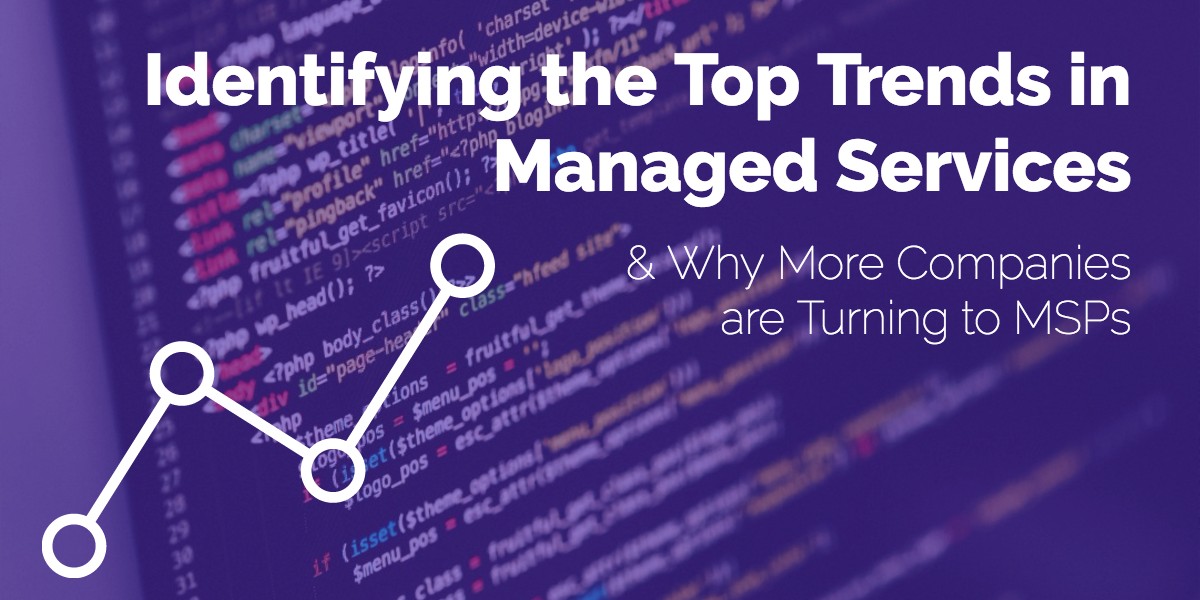These days, Managed Services likely seems to be a buzzword you hear everywhere you turn. However, it’s more than a buzzword or fad, this developing business practice appears to only be growing in popularity.
At the core of any successful contingent workforce strategy lies a Managed Service Provider.
Why More Companies are Turning to MSPs
In short, managed services means outsourcing every day management functions to a third party, often known as a Managed Service Provider (MSP).
A report from the Aberdeen Group, Building a Business Case for MSP Solutions, shows how MSPs provide companies with a flexible workforce that can help drive down cost and increase efficiency while closing the gap for needed talent. The expertise that comes from an MSP can help mitigate risks associated with contractors and agreements for SOW projects and increase productivity for their partners.
Now, more and more companies have turned to managed services for many of their management needs, particularly in IT and engineering. According to CompTIA's 4th Annual Trends in Managed Services report, "the global managed-services market is predicted to grow to $193B by 2019, at a Compound Annual Growth Rate (CAGR) of 12.5%."
According to the research, here’s why companies are making the switch to managed services (rated from highest priority):
- Improve efficiency and reliability of operations
- Enhanced security and compliance
- Proactive approach to maintenance
- ROI
- Allow staff to work on strategic projects
- Access to new technologies
- Lack in-house staff for certain functions
- Switch from capital expenditures to operating expenses
- Predictable pricing
When focusing in on B2B companies, we see why more businesses choose to add managed services to their management strategies. A recent survey revealed the following about B2B companies using managed services:
- 63% strongly agreed or agreed that B2B Managed Services allowed them to improve planning for B2B budget and resources.
- 59% were able to reduce costs related to B2B integration (developing maps, onboarding business partners, etc.).
- 78% of those using managed services for 5 years or more strongly agreed or agreed that managed services improved efficiency of onboarding new partners.
More effective, efficient, and secure operations encourage businesses to turn toward managed services for support.
What managed services trends can we expect in the future?
There’s a promising future ahead for managed services as companies become more specialized, customers become more informed, and experience and discovery help improve the overall quality of service in the market.
Cloud Economics
As research shows, most companies’ chief concerns deal with preserving their valuable data and protecting their IP. Now, a majority of companies turn to cloud economics for security, organization, and compliance strategies. This cuts costs and efforts for companies trying to keep up with government and industry regulations and require easy access to drives and archives for the right people.
Compliance as a Service (CaaS)
Everyone wants to protect their sensitive information, but highly-regulated industries like healthcare and financial services have to maintain top security for their data. Noncompliance with regulations like HIPAA can result in major legal ramifications for health care services and these companies can’t afford to risk a security breach. More companies turn to MSPs to protect their sensitive data and handle the documentation, scanning, and monitoring that may be required for compliance.
Two-factor Identification and Identity Access Management
With security and compliance being two primary factors for businesses turning to the cloud and MSPs, expect to see even more MSPs crack down on hackers and increase security services. Identity Access Management ensures the right people get the right access to the right information at the right time. Two-factor identification provides an additional layer of security to email, portals, archives, etc. that decreases the effectiveness and chance of success for security attacks. Expect to see increased efforts and service offerings from MSPs for the highest-quality security and IAM.
Increased Budget
A recent study from Stanford Global Supply Chain Management Forum showed that Managed Services budgets are expanding, particularly for B2B enterprise businesses, as they recognize the benefits this service can provide for their companies.
Cleanroom & Controlled Environment Cleaning
Many industries require controlled environments for testing, research, and manufacturing of products. These rooms are unique to the specific needs of the project, whether for electrical testing or pharmaceutical research, and typically must meet certain compliance standards before operation begins. You may now see MSPs move to provide services for cleanroom certification and testing so companies may adequately test, research, or manufacture in a controlled environment with the assurance of mitigated risks and high-quality performance. Some may even assist with training, audits, and protocol development.
Remote Monitoring Management (RMM)
Remote Monitoring Management tracks the health of networks and computers from a remote location. RMM allows MSPs to proactively track and manage technology and technology staff for companies. Using RMM, MSPs can resolve clients’ issues quickly, sometimes even before the company experiences the issue in their offices. As RMM grows in use, expect to see new RMM features from MSPs platforms like using RMM to automate scheduled maintenance tasks and monitor multiple workstations and clients at once.
EMM (Enterprise Mobility Management)
It’s no secret, the world has gone mobile—and so are businesses. Enterprise businesses need help identifying and understanding their mobile device management and often require ongoing support for enterprise mobility needs. As MSPs recognize this, expect to see EMM become an a part of the provided services.
MSPs aren’t going anywhere anytime soon.
As more businesses turn to MSPs for help and more MSPs discover ways to offer high-quality service packages, expect them to improve and their services to become in higher demand.
Ultimately, companies need the help of Managed Service Providers as they face challenges to increase efficiency and visibility, decrease costs and security risk, and identify the best talent to accomplish the tasks at hand. Utilizing a contingent workforce can be complex—fortunately, MSPs help companies manage contingent workers and execute the best strategies to meet their goals.




